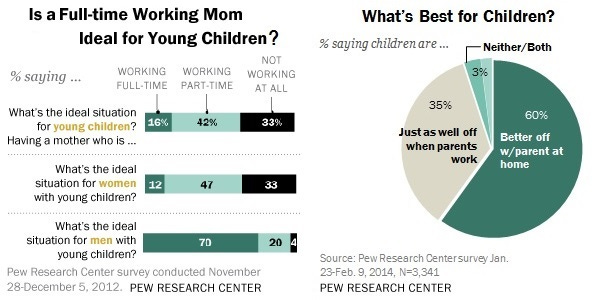TSIYON NEWS - Work and Family
Tsiyon Messianic Radio Newsletter - Vol 19.46 - 09/21/6024 TAM - 11/23/2024 AD
From Eliyahu
Balancing 'this' against 'that' seems to be an ever-present challenge of modern life. One such dichotomy women face today involves the claims of feminism as opposed to traditional values, and more especially, Biblical values. This is not a simple black and white choice because society has altered expectations on women in accord with a feminist mindset, while at the same time retaining some important traditional views. Many women feel caught in the middle, trying to balance the fallout the opposing positions bring into their lives. Before we get into that though, lets take a look at how social expectations have changed over the course of one lifetime.
Probably the most influential feminist voice of the 1960s was Betty Friedan. Her 1963 book, The Feminine Mystique, challenged the traditional roles of women that most women of that era embraced, claiming that women were oppressed and that many women felt great dissatisfaction as housewives.
While the media, Hollywood, and the upper class fully bought into Friedan's work, Friedan's ideas also had their critics. Of course there were objections on Biblical grounds. Apart from that, some argued that Friedan's book primarily addressed the concerns of white, middle-class, educated women, while neglecting the experiences of women of color, working-class women, and those from different socioeconomic backgrounds.
Some saw Friedan's focus as elitist, feeling it did not recognize the realities of the lives of most women. However, the fact that the elites and celebrities adopted the feminist views of Friedan set the pace for many, if not most, ordinary women who followed the trends of those they viewed as their betters. Upon accepting the view of themselves as victims of oppression, millions of women joined the women's liberation movement, or were influenced by it. Once it became accepted that being a housewife in the home was akin to being a slave, it naturally followed that a woman must work outside the home to find freedom, satisfaction and self-worth. This brought on many changes in society.
While ideals such as equal pay for equal work are only fair, the women's liberation movement went far beyond that. The change in society brought on by feminism created some major problems for families. For example, in 1959, the divorce rate in the United States was approximately 2 divorces per 1,000 people. After the related social changes over the next 40 years, the divorce rate in the United States in the year 2000 was approximately 4 divorces per 1,000 people - that's about double what it had been before feminism came on the scene. That's a lot of added stress on men and women, not to mention the pain caused to children from family breakups, and the negative effect on society as a whole. All of this domestic chaos has left many people with a dim view of marriage, which view itself breaks down families and family values for unmarried people as well. The conflict between the progressivism largely spawned by feminism, and traditional family values, has caused unprecedented division among the people of all western nations.
Of course, if you are a woman in the workplace, which many women these days must be to survive, you may be expected to be a feminist, even if you aren't. It can seem like literally all women are required to be feminists. Actually though, a growing number of women have, or are in the process, of rejecting feminism. I wanted to check this out and found Category: female critics of feminism at Wikipedia which includes 116 pages listing such women - most, if not all, being famous women!
OK, with this background lets return to the dichotomy many women still face today balancing the claims of feminism as opposed to traditional values, and more especially, Biblical values regarding moms and families. Has a lifetime of feminism erased traditional family values in the minds of most people? Let's look at available data to find out.
I found two Pew Research Center surveys that deal with questions regarding moms and children. These surveys are both about a decade old because I couldn't find any newer data on these subjects. However, I think these are still representative of the public as a whole. The survey from the end of 2012 answers the question: Is a full-time working mom ideal for young children?
When phrased as to what's best for young children 42% said that mom working part-time was ideal, while 33% said mom not working at all was ideal for her children. Only 16% said that it was ideal for children if mom works full-time.
Next, the question was phrased as: What's the ideal situation for women with young children? Surprisingly, after 60 years of feminist cultural dominance only 12% thought that full-time work for mom was ideal.
Finally, the question was phrased: What's the ideal situation for men with young children? 70% said that men with young children should work full-time! Put this all together and the majority opinion seems to be that, ideally, men should be the primary breadwinners, while mom's should be focusing primarily on raising the children at home, with either no outside work or part-time work only.
The other survey I looked at reported that about 2 out of 3 people thought children were better off with a parent at home. Judging from the results of the first survey in which most people thought the man should be working full-time, that parent at home would be mom.
This data does not square well with feminist claims. So far as raising children is concerned, It turns out that even in this era when feminism is taken for granted most people would prefer the family values of the 1950s as opposed to the feminist system of today. Why? Because many moms who would like to be home enjoying their children and family can't be, with economic pressures requiring them to be working full-time. It seems the 'oppressor' has gone from being the man of the house to being the barons of the economic system, putting mom in a place of having to serve the economic system instead of her family, even when she would rather be home with her children. This is not her fault, but is the product of a failed system.
It turns out that Betty Friedan was wrong. If after 60+ years of feminism most people would still rather have mom concentrating her considerable talents on home and family, with dad serving as the principle breadwinner, then we can conclude that mom being primarily a homemaker was not because she was oppressed. It was because her chosen priority was her family. Family was her ideal all along.
Being a wife and mother, a homemaker, is arguably the most important job in the world. Certainly her family thinks so. Here are a few verses out of many that talk about such a woman:
"Strength and honor are her clothing; She shall rejoice in time to come. She opens her mouth with wisdom, And on her tongue is the law of kindness. She watches over the ways of her household, And does not eat the bread of idleness. Her children rise up and call her blessed; Her husband also, and he praises her: "Many daughters have done well, But you excel them all." Charm is deceitful and beauty is passing, But a woman who fears YHWH, she shall be praised. Give her of the fruit of her hands, And let her own works praise her in the gates." Proverbs 31:25-31
Tonight Abigail, along with a panel of praiseworthy women, will be discussing the theme: Balancing Yahweh's Authority and Biblical Headship. This live stream panel discussion will begin tonight at Tsiyon.Net at 8 PM, Central. All are invited. Ladies, this is especially for you!
Eliyahu
Tsiyon.Org
"In the world you shall have tribulation; but be of good courage!
I have overcome the world." John 16:33







